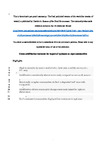Ocean acidification increases the impact of typhoons on algal communities
| dc.contributor.author | Hudson, CJ | |
| dc.contributor.author | Agostini, S | |
| dc.contributor.author | Wada, S | |
| dc.contributor.author | Hall-Spencer, Jason | |
| dc.contributor.author | Connell, SD | |
| dc.contributor.author | Harvey, BP | |
| dc.date.accessioned | 2023-02-16T17:07:58Z | |
| dc.date.issued | 2023-03-20 | |
| dc.identifier.issn | 1879-1026 | |
| dc.identifier.issn | 1879-1026 | |
| dc.identifier.other | 161269 | |
| dc.identifier.uri | http://hdl.handle.net/10026.1/20412 | |
| dc.description.abstract |
Long-term environmental change, sudden pulses of extreme perturbation, or a combination of both can trigger regime shifts by changing the processes and feedbacks which determine community assembly, structure, and function, altering the state of ecosystems. Our understanding of the mechanisms that stabilise against regime shifts or lock communities into altered states is limited, yet also critical to anticipating future states, preventing regime shifts, and reversing unwanted state change. Ocean acidification contributes to the restructuring and simplification of algal systems, however the mechanisms through which this occurs and whether additional drivers are involved requires further study. Using monthly surveys over three years at a shallow-water volcanic seep we examined how the composition of algal communities change seasonally and following periods of significant physical disturbance by typhoons at three levels of ocean acidification (equivalent to means of contemporary ∼350 and future ∼500 and 900 μatm pCO2). Sites exposed to acidification were increasingly monopolised by structurally simple, fast-growing turf algae, and were clearly different to structurally complex macrophyte-dominated reference sites. The distinct contemporary and acidified community states were stabilised and maintained at their respective sites by different mechanisms following seasonal typhoon disturbance. Macroalgal-dominated sites were resistant to typhoon damage. In contrast, significant losses of algal biomass represented a near total ecosystem reset by typhoons for the turf-dominated communities at the elevated pCO2 sites (i.e. negligible resistance). A combination of disturbance and subsequent turf recovery maintained the same simplified state between years (elevated CO2 levels promote turf growth following algal removal, inhibiting macroalgal recruitment). Thus, ocean acidification may promote shifts in algal systems towards degraded ecosystem states, and short-term disturbances which reset successional trajectories may ‘lock-in’ these alternative states of low structural and functional diversity. | |
| dc.format.extent | 161269-161269 | |
| dc.format.medium | Print-Electronic | |
| dc.language | en | |
| dc.language.iso | eng | |
| dc.publisher | Elsevier | |
| dc.subject | CO2 seeps | |
| dc.subject | Community dynamics | |
| dc.subject | Competition | |
| dc.subject | Ecosystem function | |
| dc.subject | Global change ecology | |
| dc.subject | Inhibition | |
| dc.subject | Regime shift | |
| dc.subject | Recovery | |
| dc.subject | Resistance | |
| dc.subject | Stability | |
| dc.subject | Turf algae | |
| dc.title | Ocean acidification increases the impact of typhoons on algal communities | |
| dc.type | journal-article | |
| dc.type | Journal Article | |
| plymouth.author-url | https://www.webofscience.com/api/gateway?GWVersion=2&SrcApp=PARTNER_APP&SrcAuth=LinksAMR&KeyUT=WOS:000921421600001&DestLinkType=FullRecord&DestApp=ALL_WOS&UsrCustomerID=11bb513d99f797142bcfeffcc58ea008 | |
| plymouth.volume | 865 | |
| plymouth.publication-status | Published | |
| plymouth.journal | Science of the Total Environment | |
| dc.identifier.doi | 10.1016/j.scitotenv.2022.161269 | |
| plymouth.organisational-group | /Plymouth | |
| plymouth.organisational-group | /Plymouth/Faculty of Science and Engineering | |
| plymouth.organisational-group | /Plymouth/Faculty of Science and Engineering/School of Biological and Marine Sciences | |
| plymouth.organisational-group | /Plymouth/PRIMaRE Publications | |
| plymouth.organisational-group | /Plymouth/REF 2021 Researchers by UoA | |
| plymouth.organisational-group | /Plymouth/REF 2021 Researchers by UoA/UoA07 Earth Systems and Environmental Sciences | |
| plymouth.organisational-group | /Plymouth/Research Groups | |
| plymouth.organisational-group | /Plymouth/Research Groups/Marine Institute | |
| plymouth.organisational-group | /Plymouth/Users by role | |
| plymouth.organisational-group | /Plymouth/Users by role/Academics | |
| dc.publisher.place | Netherlands | |
| dcterms.dateAccepted | 2022-12-25 | |
| dc.rights.embargodate | 2024-1-6 | |
| dc.identifier.eissn | 1879-1026 | |
| dc.rights.embargoperiod | Not known | |
| rioxxterms.funder | Japan Society for the Promotion of Science | |
| rioxxterms.identifier.project | JSPS KAKENHI | |
| rioxxterms.versionofrecord | 10.1016/j.scitotenv.2022.161269 | |
| rioxxterms.licenseref.uri | http://www.rioxx.net/licenses/all-rights-reserved | |
| rioxxterms.licenseref.startdate | 2023-03-20 | |
| rioxxterms.type | Journal Article/Review | |
| plymouth.funder | JSPS KAKENHI::Japan Society for the Promotion of Science |


